GREENEVILLE – Tusculum University shared the positive experience that awaits new students as it rolled out the welcome mat during a recent open house.
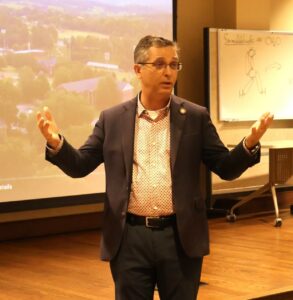
Dr. Scott Hummel, Tusculum University’s president, speaks at the open house.
Administrators, staff members and coaches highlighted during the Saturday, Oct. 26, event how Tusculum students benefit from studying in a caring Christian environment that prepares them to be career-ready, civically engaged professionals.
Dr. Scott Hummel, Tusculum’s president, emphasized the university delivers an active and experiential education. This approach enables students to conduct cutting-edge research on topics such as potential medications to fight cancer as well as participate in internships and other activities that supplement standard classroom instruction.
“You have picked a great university to come and explore,” Dr. Hummel told attendees. “You are not going to be a number at Tusculum University. Your professors are actually going to know you. They know what you can do and will push you to be even better. Sometimes, I’m able to see and our professors and staff are able to see something in you that you may not be able to see in yourself yet.”
Tusculum is the first higher education institution in Tennessee, founded by Presbyterians in 1794. Dr. Hummel relayed how President George Washington was one of the university’s first donors. The pioneering spirit that pervades Tusculum is evident in other historical nuggets such as the university being the first higher education institution in Tennessee to educate an African-American and the first Presbyterian college to admit women.
“Our founders were trying to bring the light of education to individuals and communities and trying to help build the republic,” Dr. Hummel said. “We’re still building on that incredibly rich history. You’re going to be part of something that goes back centuries.”
Components of a Tusculum education
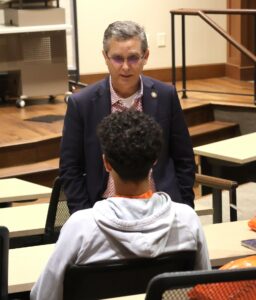
Dr. Scott Hummel speaks with a potential new student.
Tusculum focuses on providing students with an affordable education that leads to graduation. As part of their studies, students discover their purpose and their calling, which guides their futures at work and in their personal lives. At the same time, students will become even better citizens through their community service work, which illustrates what it means to be a Pioneer.
Tusculum holds well-known events, such as Nettie Fowler McCormick Service Day, to undertake such work. The university’s Bonner Leader Program, one of the most active groups on campus, regularly participates in service work. Dr. Hummel was particularly pleased Tusculum students were able to assist community organizations with the recovery process in the aftermath of Hurricane Helene.
“Wherever your hometown is, this will also be your community,” he said. “We give back our community, and we certainly receive help from our community.”
Students also develop critical-thinking skills, listen and connect with others civilly and respectfully at Tusculum. They learn the hard skills from their courses and soft skills, such as communication, collaboration and the importance of arriving on time. In addition, students also sharpen character skills – doing the right thing the right way.
“I talk to a lot of employers, and they want to hire Tusculum University graduates because we build the hard skills, the soft skills and the character skills in you,” Dr. Hummel said.
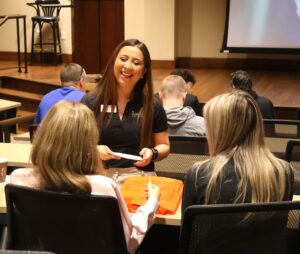
Jaileen Castro, an enrollment representative and event coordinator, speaks with a family at the open house.
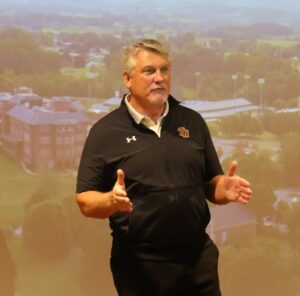
Billy Taylor, Tusculum’s head football coach, speaks at the open house.
Billy Taylor, Tusculum’s head football coach, followed up on Dr. Hummel’s remarks by sharing with parents attending the open house what is important to him in addition to winning games as he recruits student-athletes.
“Our job as college football coaches is to take your child, who is the most precious thing in the world to you, and step in after the great job you have done for 18 years and give them back to you four or five years later even better and more prepared for life,” he said. “That’s what our goal at Tusculum University is.”
Jaileen Castro, an enrollment representative and event coordinator at Tusculum, who oversaw the open house, earned her bachelor’s and master’s degrees from the university. She has great pride for her alma mater that carries over into her role in bringing new students to Tusculum.
“I had a great experience as a student at Tusculum University,” she said. “It is my home away from home. I have met many people that make me want to keep being a Pioneer. I am enthused about helping new students in the next part of their journey. We will be there every step of the way from your application to your enrollment at Tusculum.”
In addition to sharing the overall perspective about Tusculum, the university delved into further details about becoming a student and life on campus once a Pioneer is enrolled.
Financial aid opportunities
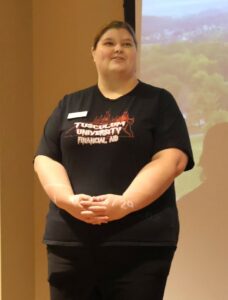
Melissa White, director of financial aid, addresses the audience.
Melissa White, director of financial aid, shared that students applying for college should being preparing to submit their FAFSA form when the federal government launches it Dec. 1. She said students and their parents should create a FSA ID for the FAFSA form by Thanksgiving so the federal government can verify it. That provides additional time in cases some issues arise that need to be resolved.
She said the FAFSA form to complete will be for the 2025-26 academic year but that the income tax information parents will need to insert will be from their 2023 tax year. Tusculum’s Office of Financial Aid, located on the ground floor of Virginia Hall, is available to assist families with completion of the FAFSA.
White said every traditional Tusculum student receives an academic scholarship that ranges from $6,000-$15,000. In addition, those who live in Tennessee, have a 3.0 grade point average, qualify for a full Pell grant and complete the FAFSA by Feb. 1 might potentially become one of Tusculum’s Pioneer 100 students. That status results in the student attending the university tuition-free.
Tusculum also offers multiple additional scholarships and work-study opportunities to help students achieve their academic dreams. Students can visit https://site.tusculum.edu/financial-aid/, call 423-636-7377 or email financialaid@tusculum.edu to learn more.
Student Affairs and Student Support Services
Open house attendees also had the opportunity to visit with Chuck Sutton, associate vice president of student affairs and retention, and Steve Anderson, multicultural retention coach with Student Support Services.
Sutton detailed the robust programs and activities Student Affairs oversees. They include intramurals for all Pioneers, multiple clubs, the Student Government Association and programs that highlight healthy student lifestyles. Sutton said students who are interested in forming a new club are welcome to approach Student Affairs about establishing it.
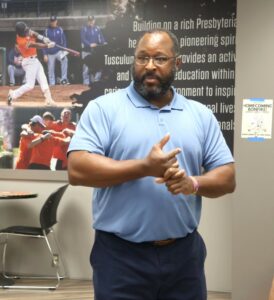
Steve Anderson, multicultural retention coach with Student Support Services, speaks with prospective students and their family members.
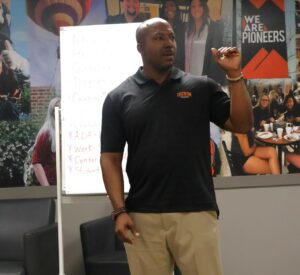
Chuck Sutton, associate vice president of student affairs and retention, speaks to prospective students and their family members.
In addition, Student Affairs houses about 700 residential students in traditional residence halls as well as apartments. The resident assistants in these residence halls support students with their day-to-day living needs and plan additional programs and activities.
Student Affairs also collaborates with two licensed counselors who work with students experiencing challenging moments in their lives. Dr. Chris Shumate, the assistant vice president of student affairs, also serves as the campus minister and oversees the weekly voluntary chapel sessions as well as coordinates with leaders of other ministries available to students on and off campus.
SSS is a federal TRIO program that provides free services to students whose parents or guardians do not have a bachelor’s degree. It also serves students from low-income families or who have a disability. Anderson noted that students who have had an Individualized Education Plan qualify for SSS.
Nearly 60 percent of Tusculum’s students have parents who have not earned a bachelor’s degree. These Pioneers are classified as first-generation students.
SSS provides academic advising, financial literacy education, assistance with the FAFSA, graduate school advising and counseling as well as tutoring. SSS participants also have the opportunity to take free trips that incorporate cultural activities and visits to graduate school programs. Among the cities SSS has visited in recent years are New York and New Orleans.
Tusculum is accepting applications for the spring and summer semesters and fall 2025 at https://site.tusculum.edu/apply-visit/apply/. Potential students or family members can email admission@tusculum.edu or call 423-636-7312 with questions. More information about the university is available at www.tusculum.edu.


